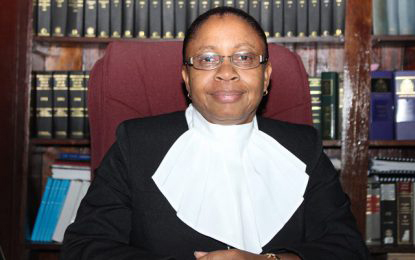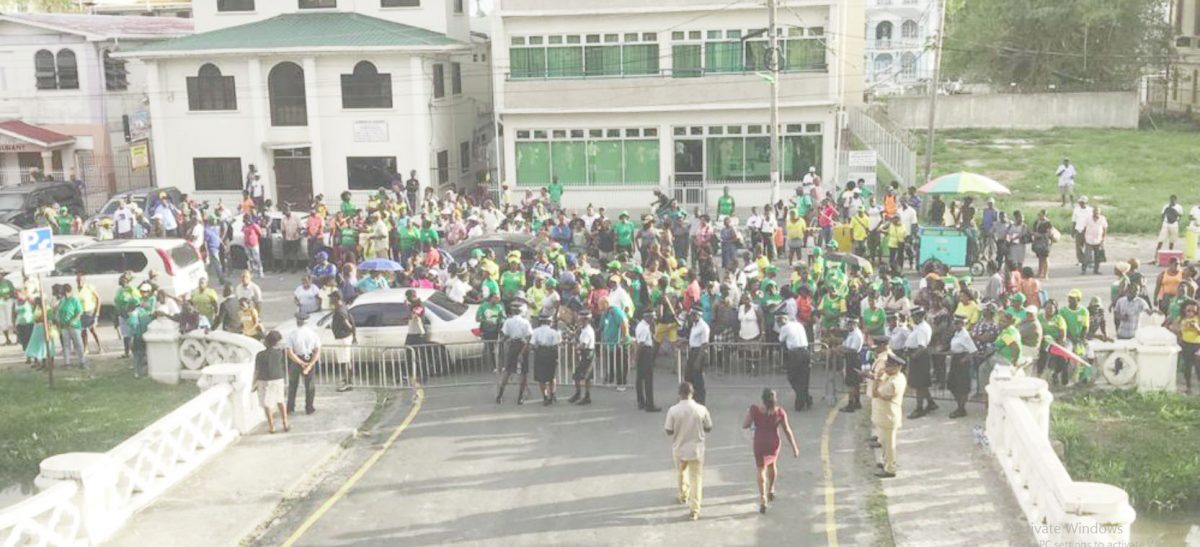At 2 this afternoon, acting Chief Justice Roxane George-Wiltshire will deliver her ruling on the suit seeking full verification of the vote count for Region Four at last Monday’s general and regional elections.
Having ruled on Sunday that she has the jurisdiction to hear the matter, Justice George-Wiltshire considered arguments on the application yesterday afternoon, after which she announced that her decision will be delivered today.
Opposition PPP/C supporter Reeaz Hollader, by whom the action was brought, is contending that in accordance with the law, there could be no declaration of a final result for the electoral district in the absence of fully verifying those votes.

Roxane George-Wiltshire
Last Thursday, the Guyana Elections Commission (GECOM)—a respondent in the matter, along with Chief Election Officer Keith Lowenfield and District Four’s Returning Officer (RO) Clairmont Mingo—controversially declared the results for the district, which show the incumbent APNU+AFC coalition securing 136,335 of the valid votes cast compared with 77,259 votes secured by the PPP/C.
At yesterday’s hearing, counsel for GECOM, Neil Boston SC, sought to refute arguments advanced by Hollader’s attorney, Senior Counsel Douglas Mendes, that there was any law which required verification of votes.
As a matter of fact, Boston said that in his capacity as RO, Mingo could adopt whatever methodology in his deliberate judgment he decided upon and thereafter proceed with declaring the results.
According to counsel, the RO could have sat with the persons duly authorised to be present when the votes were being ascertained for tabulation as he had initially begun doing before being interrupted by loud shouting from opposition members and other political parties, or he could have resorted to the use of a spreadsheet as was also being used.
Boston said that if a party is aggrieved as to any discrepancy which may arise in the tabulation, the law in Section 84 (1) of the Representation of the People Act has provided a remedy for a recount.
He said that this was why Opposition counting agent Charles Ramson Jnr had invoked that remedy in Section 84 (2).
Boston also tried to make the case on behalf of his clients that there had been substantial compliance with the Act since Mingo had spent several days following the close of polls going through the tabulation of District Four’s votes in the presence of observers.
He asserted that the RO did not have to do so, but did anyway, and contended, while submitting case law, that he had substantially complied in this regard with the verification sought by the opposition.
But Mendes questioned the merit of Boston’s argument, while pointing out that with less than 50% of the votes for District Four having not been verified, Mingo could not be regarded as having substantially complied with the law.
This prompted an observation from the Chief Justice, who also noted that there were more than half of the votes still to be presented for scrutiny.
Of the 879 statements of poll (SOPs) for District Four, only 421 had been verified, leaving an outstanding amount of 458.
Disregard
Mendes pointed out, too, that at no point did the respondents deny that the verification of the remaining SOPs had not been done in the presence of observers as required by Sections 84 (1) and 86 (1).
He also took issue with what he described as Mingo’s disregard for the law in not allowing a polling clerk, the duly authorised person, to have entered tabulated data into the computer.
Instead, and as was not denied by the respondents, Mendes said that Mingo allowed this data entry to be performed by a senior clerk, who was not supervised.
The lawyer argued that not only was this not a duty for a senior clerk, but that Mingo, who said he was not around when the data was entered, did not see it fit to ensure that he was present to supervise this process.
Mendes noted that a poll clerk is specially sworn under oath to perform such functions, even as he questioned by whom the senior clerk would have received assistance as had been stated in that person’s affidavit.
The attorney said that the data on the SOPs which were in possession of the opposition, was different from that which Mingo had.
Against this background the Chief Justice sought to ascertain how such discrepancies are to be resolved. The judge noted that the court was not interested in getting into the specifics of any vote counting at that point, or matters which would concern an elections petition, but asked the means through which such an issue would be dealt with in a public transparent manner.
In response, both attorneys conceded the point that it would be the RO’s SOP which would at the end of the day be used, and that any further clarification may come from a recount or challenge in an elections petition.
To Boston’s arguments that the law does not provide for verification, Mendes clarified that while that is so, there are mechanisms and requirements in Sections 84 for votes to be ascertained before declaration, and stated that it was in this specific context that the word verification was being used merely as a synonym.
The section, which specifies the process for the counting of votes, prescribes, among other things, that as soon as practicable after the receipt of all the ballot boxes and the envelopes and packets delivered to him in pursuance of Section 83 (10), the RO shall, in the presence of those legally entitled to be in attendance, ascertain the total votes cast in favour of each list in the district by adding up the votes recorded in favour of the list in accordance with the statements of poll (SOPs) and thereupon publicly declare the votes for each list of candidate.
Section 84 (1) (a) of the Act adds that where an election officer for a polling district discovers a material error on the SOP from a polling station for that polling district, he shall inform the presiding officer for that polling station forthwith, and the presiding officer, if the SOP has not yet been sent to the RO shall, in the presence of the persons who signed the original SOP, prepare a corrected one signed by himself and the original signatories present, and the corrected SOP shall be sent to the returning officer.
Mendes said that an invalid declaration would only erode public trust and confidence in the process, which would attract suspicion. He pointed to a number of case law authorities which he said substantiated the grant of the relief sought by his client.
Relying on the presumption of regularity, Boston said that Mingo complied with Section 84 (1) in declaring the results, which according to counsel, would negative any doubt as to whether he did.
Justice George-Wiltshire, however, then asked Boston to show by what means the RO would have complied with the Section, since it was not stated in his affidavit how he so did. Boston was unable to do so.
“It is his [Mingo’s] affidavit and he could have expressly stated this,” the judge said.
The lawyer said that while that is so, even if Mingo did not declare the results in the presence of observers, he has nonetheless said that he made the declaration and that that would not invalidate the declaration.
The Chief Justice noted her observation that many persons on both sides seemed to have misconstrued what is required in Sections 84 (1) and were confused.
She said that from the affidavits submitted, there clearly was no methodology of who the authorised persons to have been observing the process were and what was required. She said it seemed everyone did their own thing and persons just needed to figure it out.
The hearing lasted for just about two hours in the chief justice’s courtroom, which was packed to capacity, thereby necessitating additional seating accommodation having to be brought in.
While for the two previous hearings over the weekend hardly anyone had been present for the APNU+AFC coalition, many of its ministers were present at court yesterday and so were Lowenfield and Mingo, who after the commotion at GECOM’s command centre last week, had gone silent for a number of days.
Scores of the coalition’s supporters lined the street outside the courthouse anxiously awaiting word following the conclusion of the hearing.
Last Thursday, Justice Navindra Singh granted the opposition an injunction prohibiting the GECOM or any of its functionaries from making a declaration of the total count for District Four, unless there is full compliance with the law.
While the regional results for all the other nine electoral districts were publicly declared by their respective district Returning Officers, the results for District Four were released to the media fraternity via WhatsApp after 9 of the 10 parties contesting objected to attempts by Mingo to make this declaration.
While the verification process of the tabulation of votes for district four had commenced earlier, on Thursday, it was halted with the understanding that it would be resumed later. However, following commotion which erupted at GECOM’s command centre between local party observers on both the government and opposition sides, Mingo began announcing the results for district four.
His attempts were, however, drowned out by loud shouting from members of the opposition and other political parties. It was after this that GECOM’s Public Relations Officer Yolanda Ward disseminated the results to the media via WhatsApp.
The statutory Declaration Form 24 was signed by Mingo and countersigned by Volda Lawrence the APNU+AFC Counting Agent. All other Counting Agents refused to sign the document.
If the numbers are accurate and are mirrored at the general elections, the APNU+AFC coalition would have won the elections by in excess of 7,000 votes or one seat.
Since the completion of voting more than a week ago, citizens have been waiting anxiously to see who will form the next government. Both the APNU+AFC and PPP/C have claimed victory.
Following the declaration made by Mingo for the results of district four, PPP/C supporters have staged protests in several villages across the country, some of which erupted into violence.
Police fatally shot a teen at Cotton Tree Village, West Coast Berbice after he allegedly attacked and chopped ranks who had been deployed to the area.






